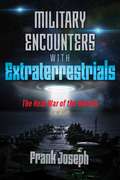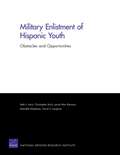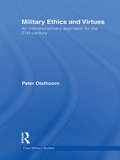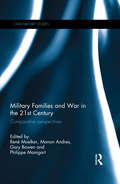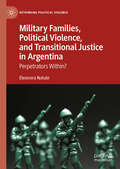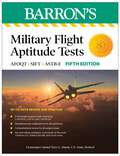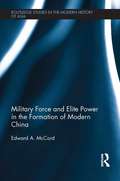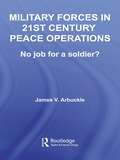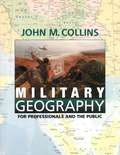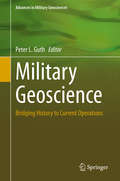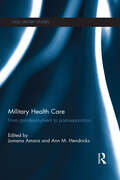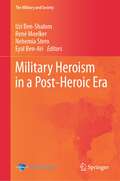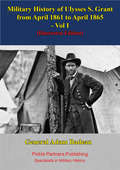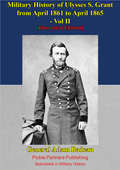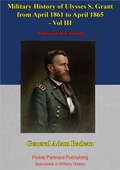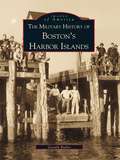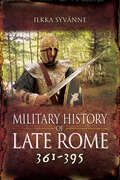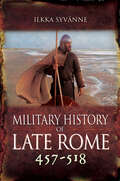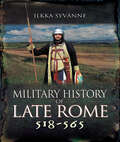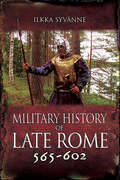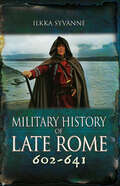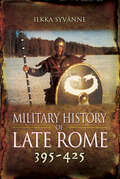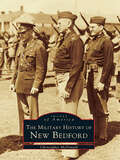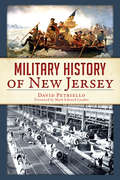- Table View
- List View
Military Encounters with Extraterrestrials: The Real War of the Worlds
by Frank JosephThe first, comprehensive military history of armed confrontations between humans and extraterrestrials • Includes documentation of incidents from World War I, World War II, the Korean War, the Vietnam War, the Gulf War, and the ongoing hostilities in the Middle East • Reveals the U.S. Navy’s defeat in Antarctica by ETs, the shoot-down of “flying saucers” at Roswell, alien sabotage of nuclear weapons, in-flight abductions of USAF and Soviet officers, and photographic evidence of the Battle of Los Angeles • Explains the link between the development of atomic bombs and ballistic missiles and the increase in extraterrestrial intervention in the 20th century Although close encounters with alien space craft are reported as far back as the reign of Pharaoh Thutmosis III in Egypt, it wasn’t until the 20th century that UFO sightings and extraterrestrial encounters were truly documented, due to advances in technology and record-keeping as well as the vast increase in incidents, particularly with military forces. Revealing his extensive research and the verifiable evidence he’s discovered, Frank Joseph presents a comprehensive military history of armed confrontations between humans and extraterrestrials in the 20th and 21st centuries. He explains how, with the development of atomic bombs and ballistic missiles, the frequency of extraterrestrial intervention in human affairs increased dramatically. He documents incidents both famous and little known, including the explosive demolition of U.S. munitions factories in 1916 by unearthly aerial vehicles, the Red Baron’s dogfight with a UFO during World War I, “foo fighter” sightings and battles with Allied and Axis combatants during World War II, and eye-witness reports from encounters during the Korean War, the Vietnam War, the Gulf War in Iraq, and the ongoing hostilities in the Middle East. He examines the evidence for the shoot-down of “flying saucers” at Roswell and Aztec, New Mexico, alien sabotage of nuclear weapons systems, and in-flight abductions of USAF and Soviet officers and airplanes. He explores the photo evidence for the Battle of Los Angeles, which occurred three months after Pearl Harbor, and the details of Operation Highjump, the U.S. Navy’s defeat in Antarctica by ET forces 17 months after the atomic bomb was dropped on Nagasaki, while also uncovering evidence of secret Antarctic German bases. The author also examines recent, 21st-century examples of alien interdiction in Earthly affairs, such as the meltdown of the Fukushima Daiichi nuclear plant in Japan and the fiery abort of Elon Musk’s Falcon 9 missile launch, both events accompanied by UFOs. Offering complete disclosure of the multitude of ET events over the past century, Frank Joseph gives us the first true reference book in the field of alien military encounters.
Military Enlistment of Hispanic Youth: Obstacles and Opportunities
by Beth J. Asch Jacob Alex Klerman David S. Loughran Meredith Kleykamp Christopher BuckAlthough polls of Hispanic youth show a strong propensity to serve in the military, Hispanics are nonetheless underrepresented among military recruits. The authors discuss the major characteristics that disproportionately disqualify Hispanic youth and explore actions that could be taken to increase Hispanic enlistments.
Military Ethics and Virtues: An Interdisciplinary Approach for the 21st Century (Cass Military Studies)
by Peter OlsthoornThis book examines the role of military virtues in today's armed forces.Although long-established military virtues, such as honor, courage and loyalty, are what most armed forces today still use as guiding principles in an effort to enhance the moral behavior of soldiers, much depends on whether the military virtues adhered to by these militaries suit a particular mission or military operation. Clearly, the beneficiaries of these military virtues are the soldiers themselves, fellow-soldiers, and military organizations, yet there is little that regulates the behavior of soldiers towards civilian populations. As a result, troops trained for combat in today's missions sometimes experience difficulty in adjusting to the less aggressive ways of working needed to win the hearts and minds of local populations after major combat is over. It can be argued that today's missions call for virtues that are more inclusive than the traditional ones, which are mainly about enhancing military effectiveness, but a convincing case can be made that a lot can already be won by interpreting these traditional virtues in different ways. This volume offers an integrated approach to the main traditional virtues, exploring their possible relevance and proposing new ways of interpretation that are more in line with the military tasks of the 21st century.The book will be of much interest to students of military ethics, philosophy, and war and conflict in general.
Military Families and War in the 21st Century: Comparative perspectives (Cass Military Studies)
by Gary Bowen Philippe Manigart Rene Moelker Manon AndresThis book focuses on the key issues that affect military families when soldiers are deployed overseas, focusing on the support given to military personnel and families before, during and after missions. Today’s postmodern armies are expected to provide social-psychological support both to their personnel in military operations abroad and to their families at home. Since the end of the Cold War and even more so after 9/11, separations between military personnel and their families have become more frequent as there has been a multitude of missions carried out by multinational task forces all over the world. The book focuses on three central questions affecting military families. First, how do changing missions and tasks of the military affect soldiers and families? Second, what is the effect of deployments on the ones left behind? Third, what is the national structure of family support systems and its evolution? The book employs a multidisciplinary approach, with contributions from psychology, sociology, history, anthropology and others. In addition, it covers all the services, Army, Navy/Marines, Air Force, spanning a wide range of countries, including UK, USA, Belgium, Turkey, Australia and Japan. At the same time it takes a multitude of perspectives such as the theoretical, empirical, reflective, life events (narrative) approach, national and the global, and uses approaches from different disciplines and perspectives, combining them to produce a volume that enhances our knowledge and understanding of military families. This book will be of much interest to students of military studies, sociology, war and conflict studies and IR/political science in general.
Military Families, Political Violence, and Transitional Justice in Argentina: Perpetrators Within? (Rethinking Political Violence)
by Eleonora NatalePerpetrators within? provides the first ethnographic account of the experiences of military families of the Argentine dictatorship (1976-83). At the crossover of multiple disciplines, this groundbreaking study brings advancements in the fields of military and conflict studies, Latin American history, transitional justice and ethnographic methods. The military juntas that seized power in Argentina in 1976 waged a brutal 'dirty war' against communism, leading to seven years of authoritarian rule that claimed thousands of lives. The regime suppressed political opposition through kidnapping, torture, and clandestine executions. Although efforts to bring the military to justice began in 1985, legal obstacles delayed prosecutions for over 20 years. It wasn't until 2005 that trials resumed, resulting in the conviction of hundreds of former officers for crimes committed during the dictatorship. Perpetrators within? questions these unique subjects directly. For the first time, the military of the dictatorship are approached as a community of families and comrades (which includes spouses, children and ‘brothers in arms’) better to understand the personal and collective experiences of those linked to the regime's violent past. Based on extensive research with former junior officers –many now imprisoned – their wives and adult children, the book unveils the social and family life of the military of the 1970s, it investigates the everyday unexceptional scenarios of repression, and it describes the long road to justice from the point of view of military families involved in the trials. A vital contribution to understanding the workings of kinship, military power and violence, this book offers a deeper ad original perspective on one of the darkest chapters in Latin American history.
Military Flight Aptitude Tests, Fifth Edition: 6 Practice Tests + Comprehensive Review (Barron's Test Prep)
by Terry L. DuranBe prepared for exam day with Barron&’s. Trusted content from Military Flight Aptitude Test experts!Barron&’s Military Flight Aptitude Tests includes in-depth content review and practice. It&’s the only book you&’ll need to be prepared for exam day.Written by Experienced EducatorsLearn from Barron&’s--all content is written and reviewed by Military Flight Aptitude Test expertsBuild your understanding with comprehensive review tailored to the most recent exams:AFOQT (Air Force Officer Qualifying Test)SIFT (Army Selection Instrument for Flight Training)ASTB-E (Navy/Marine Corps/Coast Guard Aviation Selection Test Battery)Get a leg up with tips, strategies, and study advice for exam day--it&’s like having a trusted tutor by your sideBe Confident on Exam DaySharpen your test-taking skills with 6 practice tests, including 2 practice AFOQTs, 2 practice SIFTs, and 2 practice ASTB-EsReinforce your learning with detailed answers and explanations for all test questionsStrengthen your knowledge with in-depth review covering all major subtests and topics covered on each exam, including language, mathematics, technical knowledge, science, and mental skillsDeepen your understanding with expert advice about becoming an officer and aviator, detailed summaries of common aircraft used by the U.S. military today, a glossary of key terms and definitions, and much more
Military Force and Elite Power in the Formation of Modern China: Military Force And Elite Power In The Formation Of Modern China (Routledge Studies in the Modern History of Asia)
by Edward A. McCordThe China we know today emerged at the end of a long period of internal rebellions, civil wars, foreign invasions, and revolutionary insurrections that stretched across the nineteenth century to the mid-point of the twentieth. This book explores one important consequence of this situation—the increased role of military force in the determination of elite social, political, and economic power, and presents fascinating case studies of the warlords, militia leaders, and military officers who benefited from this. Examining the intersection of military force and elite power in the formative years of modern Chinese history, this book highlights just how important military force was to elite power in nineteenth- and early twentieth-century China in a context of frequent warfare and political turmoil. It shows that the way in which military empowerment unfolded and who exactly was empowered, depended heavily on shifting military and political conditions, and each case confirms the extent to which military force emerged as a consistently significant determinant of elite power across this period. Indeed, the transformative effect of military force on social and political structures of power revealed by these studies sheds distinctive light on the prevalence, and wide-ranging impact, of military conflicts in this period. In turn, these studies also provide a particular perspective on the fluid boundaries of, as well as the constraints on, elite power in Chinese society in a time of intense social and political change. This book makes an important contribution to our understanding of the rise of modern China, and provides a keen insight into impact of war on the country, as such, it will be welcomed by students and scholars interested in Chinese history, Asian history, and military history more broadly.
Military Forces in 21st Century Peace Operations: No Job for a Soldier? (Contemporary Security Studies)
by James V. ArbuckleA major new study of the realities of contemporary warfare, which presents a range of fresh insights and is essential reading for all students and professionals engaged in the field. This book clearly shows us that: neither military nor civilian agencies can act effectively alone in resolving modern conflicts joint civil-military efforts are needed, and those efforts must be deliberately planned from the outset of an operation; they cannot be added on as afterthoughts when all else has failed the record of our efforts over nearly a decade and a half since the end of the Cold War demonstrates that we are doing badly at creating civil-military partnerships, and that we are not getting better. James V. Arbuckle shows how these issues are neither structural nor organizational - they are cultural. They involve attitudes, beliefs, perceptions – positive and negative, true and false. The solutions will involve changing attitudes, moving beyond prejudices, replacing competition with cooperation. The principal mechanisms for this will be common civil-military training and education.
Military Geography: For Professionals and The Public
by John M. CollinsThis book covers many topics that are crucial to military planning but often receive only passing mention in histories or briefings. Collins, a former Army officer, stresses land geography, but he does not stint oceans, the atmosphere, or interplanetary space. His discussions of urban areas are too brief, given the increasing amount of large-scale violence in cities since the end of World War II.
Military Geoscience: Bridging History to Current Operations (Advances in Military Geosciences)
by Peter L. GuthThis book is a collection of papers presented at the 11th International Conference of Military Geoscience that was held in 2015. The conference included discussion on a diverse range of geosciences, including military history, military geology, teaching geology from a military prospective, geological influence on the battlefield, and environmental and cultural issues related to management of military lands. Geology and geography have played a significant role in military history, from providing the stone for primitive tools and weapons, to the utilization of terrain in offensive and defensive strategies. Specific to this volume, deserts comprise nearly a third of the Earth’s surface and have been the site of numerous battles where the dust, heat, and a lack of food and water have provided challenges to military leaders and warriors. This book examines the role of deserts in past and modern warfare, the problems and challenges in managing military lands in desert regions, and how desert environmental conditions can impact military equipment and personnel. This proceedings volume should be of interest to scholars, professionals, and those interested in military history, warfare, geology, geography, cultural resources, general science, and military operations.
Military Health Care: From Pre-Deployment to Post-Separation (Cass Military Studies)
by Jomana Amara Ann M. HendricksThis edited volume surveys critical aspects of modern military health care in the US and various other Western countries with troops in Iraq and Afghanistan. In the United States, the military medical system, including care for veterans, is large and diverse and involves two institutions, the US Department of Defense (DoD) and the US Department of Veteran’s Affairs (VA). Studying the system gives practitioners and policy-makers an understanding of the larger picture of the military medical structure, facilitating thought about some of the difficulties and opportunities for coordinating treatments and preparing for the future. This book covers health care issues prior to deployment, such as screening for mental health, evaluating long-term consequences of exposure to military service, and provision of insurance; care during a conflict, primarily battlefield clinics, battlefield trauma care, and evacuation procedures; and post- combat care, including serious war injuries, psychiatric, and long-term care. Bringing together research from a wide range of contributors, the volume provides readers with an extensive, up-to-date source of information on military medicine.This book will be of great interest to students of public health, military sociology, the Iraq war, US public policy, and war and conflict studies in general.
Military Heroism in a Post-Heroic Era (The Military and Society)
by Eyal Ben-Ari René Moelker Uzi Ben-Shalom Nehemia SternThis book explores the variety of forms that individual heroism and sacrifice can take in the context of contemporary military conflicts. It addresses three key questions: How has an enduring ideal of heroism been transformed by the nature of modern warfare? Are we now witnessing the emergence of new forms of exemplary military behavior? And, have new ideals of heroism (and by association, sacrifice or bravery) been added to older forms in the recent past? The book advocates viewing the concept of military heroism as a moral category, in which its theoretical definition and empirical practice reflect those factors that are seen as being vital for society itself. The key theoretical and topical challenges addressed in the respective chapters focus on how ideas of heroism become entwined with issues of individualization (bolstered by the cultural assumptions of neo-Liberalism), the spread of the human rights discourse, and the judicialization, marketization and mediatization of armedforces. The book was written by experts on military studies, including many who are currently active military personnel. It includes contributions from a variety of disciplines, e.g. anthropology, sociology, psychology, and political science.
Military History Of Ulysses S. Grant From April 1861 To April 1865 Vol. I (Military History Of Ulysses S. Grant From April 1861 To April 1865 #1)
by General Adam BadeauIncludes Civil War Map and Illustrations Pack - 224 battle plans, campaign maps and detailed analyses of actions spanning the entire period of hostilities.Few men can have known General and President of the United States Ulysses S. Grant as well as General Adam Badeau. As Grant's military secretary during 1864-1865, he came to know and work closely with the future president; he wrote his classic account of General Grant's military abilities. Allowed access to documents produced on both the Union and Confederate armies during the war, Badeau weaves these into an excellent narrative. As a soldier himself Badeau is able to give a critical account of the battles actions and motivations that Grant was engaged in.An excellent military biography.
Military History Of Ulysses S. Grant From April 1861 To April 1865 Vol. II (Military History Of Ulysses S. Grant From April 1861 To April 1865 #2)
by General Adam BadeauIncludes Civil War Map and Illustrations Pack - 224 battle plans, campaign maps and detailed analyses of actions spanning the entire period of hostilities.Few men can have known General and President of the United States Ulysses S. Grant as well as General Adam Badeau. As Grant's military secretary during 1864-1865, he came to know and work closely with the future president; he wrote his classic account of General Grant's military abilities. Allowed access to documents produced on both the Union and Confederate armies during the war, Badeau weaves these into an excellent narrative. As a soldier himself Badeau is able to give a critical account of the battles actions and motivations that Grant was engaged in.An excellent military biography.
Military History Of Ulysses S. Grant From April 1861 To April 1865 Vol. III (Military History Of Ulysses S. Grant From April 1861 To April 1865 #3)
by General Adam BadeauIncludes Civil War Map and Illustrations Pack - 224 battle plans, campaign maps and detailed analyses of actions spanning the entire period of hostilities.Few men can have known General and President of the United States Ulysses S. Grant as well as General Adam Badeau. As Grant's military secretary during 1864-1865, he came to know and work closely with the future president; he wrote his classic account of General Grant's military abilities. Allowed access to documents produced on both the Union and Confederate armies during the war, Badeau weaves these into an excellent narrative. As a soldier himself Badeau is able to give a critical account of the battles actions and motivations that Grant was engaged in.An excellent military biography.
Military History of Boston's Harbor Islands, The (Images of America)
by Gerald ButlerThis accurate pictorial history will acquaint the reader with the seacoast defenses of Boston Harbor. Fortified since the the 1600s, seacoast defenses provided important protection for the new seaport. By the Civil War, strong granite fortresses guarded the seaward approaches to the Port of Boston. Later, powerful long-range guns and mortars protected the seaport. During World War II, the most sophisticated and powerful guns existing were installed. These guns used the first computers and radar systems developed for the military for target acquisition and tracking. In The Military History of Boston's Harbor Islands, great care has been taken to identify harbor defense systems at all of the harbor islands, mainland forts, and the observation and radar towers from Nahant to Scituate. The book identifies and explains the long-abandoned granite and concrete monoliths of Boston Harbor. The Military History of Boston's Harbor Islands brieflydescribes Edgar Allan Poe's tour of duty in Boston Harbor, the impact that Col. Sylvanus Thayer had on Boston's seacoast fortifications, and many mysterious structures at the harbor forts.
Military History of Late Rome 361–395 (Military History Of Late Rome Ser. #2)
by Ilkka SyvänneA comprehensive look at campaigns, battles, and military developments in these dramatic decades.Part of a multivolume history spanning from AD 284-641 that offers detailed accounts of campaigns, battles, and the changes in organization, equipment, strategy, and tactics among both the Roman forces and her enemies in the relevant period, this book covers the tumultuous period from the death of Constantius II in AD 361 to the death of Theodosius. Among the many campaigns covered are the Emperor Julian’s fatal campaign against the Sassanian Persians and the disastrous defeat and death of Valens at Adrianople in 378. Such calamities illustrate the level of external threat Rome’s armies faced on many fronts in this difficult period.Praise for Military History of Late Rome 425–457“An outstanding work . . . [the series] gives us a very good picture of the long process that has come to be known as the ‘Fall of Rome.’ This is an invaluable read for anyone with an interest in Late Antiquity.” — The NYMAS Review
Military History of Late Rome 425–457
by Ilkka SyvänneA history of pivotal military and political events in Ancient Rome from 425 to 457 BC.Military History of Late Rome 425–457 analyses in great detail how the Romans coped with the challenge posed by masses of Huns in a situation in which the Germanic tribes had gained a permanent foothold in the territories of West Rome. This analysis reassesses the strategy and tactics of the period. The book shows how cooperation between the West Roman Master of Soldiers, Aetius, and East Roman Emperor Marcian saved Western civilization from the barbarian nightmare posed by the Huns of Attila. A fresh appraisal of the great clash at the Catalaunian Fields in 451 offers new insights into the mechanics of the fighting and shows that it was a true battle of nations which decided nothing less than the fate of human civilization. Had Aetius and his allies lost the battle and had Marcian not cooperated with Aetius in 451 and 452, we would not have seen the rise of the West and the rise of the scientific thinking.Praise for Military History of Late Rome 425–457“An outstanding work . . . [the series] gives us a very good picture of the long process that has come to be known as the “Fall of Rome”. This is an invaluable read for anyone with an interest in Late Antiquity.” —The NYMAS Review
Military History of Late Rome 457–518
by Ilkka SyvänneA history and military analysis of the world-changing events following the fall of the Western Roman Empire.The Military History of Late Rome 457–518 provides a fresh new look into the events that led to the collapse of West Rome, while East Rome not only survived but went on to prosper despite a series of major defeats that included, most notably, the catastrophic campaign against the Vandals in 468. The author explains what mistakes the West Romans made and what the East Romans did right to survive. He analyzes the role of the barbarian generals and military forces in this and also offers an analysis of the tactical developments during this pivotal period as a result of which the cavalry, so famous from the accounts of Procopius, became the dominant arm in the East. The book also offers a detailed study of a number of battles that have never before been subjected to such scrutiny, and puts these firmly into the context of their times. At the very end of this period in 518, East Rome was poised to start its reconquest under Anastasius’ successors Justin I and Justinian I. This book explains why this was possible.
Military History of Late Rome 518–565
by Ilkka Syvänne&“An outstanding work . . . [the series] gives us a very good picture of the long process that has come to be known as the &‘Fall of Rome.&’&” —The NYMAS Review The Military History of Late Rome 518-565 provides a new, fresh analysis of the revival of Roman fortunes during the reigns of Justin I (518–527) and Justinian I (527–565). The book narrates in great detail the re-conquests of North Africa, Italy and southern Spain by Justinian&’s armies. It also explores the massive encounters between the Romans and Persians in the east, and the apocalyptic fights in the Balkans between the Romans and barbarians. The author pays particular attention to the tactics and battles so there is detailed analysis of all of the period engagements, such as Dara, Satala, Callinicum, Ad Decimum, Tricamarum, Rome, Scalae Veteres, Antonia Castra, Gallica, Campi Catonis, Hippis River, Busta Gallorum, Mons Lactarius, Casilinum, Archaeopolis, Phasis, and others. The narrative features the military exploits of the great Roman heroes, such as Belisarius and Narses, while not forgetting the many other overlooked generals such as Germanus, Mundus, John the nephew of Vitalian, Martinus, Dagistheus and Sittas, not to mention the dashing hero John Troglita whose achievements were immortalized by the Roman epic poet Corippus.
Military History of Late Rome 565–602
by Ilkka SyvänneMilitary History of Late Rome 565-602 provides a new fresh analysis of the Roman Empire in the aftermath of the reconquests of Justinian I (527-65). It is often claimed that Justinian overstretched the Roman resources, but this analysis proves that view wrong. It demonstrates that the initial troubles were largely the result of the mistakes of Justin II (565-78) and that his successors, Tiberius II (578-82) and Maurice (582-602), not only restored its fortunes but were, at the time of the death of Maurice, actually poised to complete the reconquests of Justinian. It was thanks to the reforms of Maurice, which were codified in the military treatise the Strategikon, that the Roman army had achieved a position of relative superiority over all of its enemies so that by 602 the Romans had decisively defeated the Persians, Slavs and Avars and were poised to complete the project of reconquest. These gains, however, were lost when Maurice was murdered in a military mutiny which brought Phocas to power. This volume explains why the Roman army overthrew one of the greatest Roman emperors who ever lived. This was an era of epic battles so it is not a surprise that the author also pays particular attention to the period tactics and analyses all of the period battles in great detail. These include for example such battles as Melitene, Constantia, Sirmium, Nymphius River, Solanchon, Lake Urmiah, Plain of Canzak, Iatrus, and the epic battles of Priscus and Comentiolus in the Balkans.
Military History of Late Rome 602–641
by Ilkka SyvänneThe Military History of Late Rome 565-602 provides a fresh analysis of the Roman Empire from the reign of Phocas (602-10) until the death of Heraclius (610-41). This was an era of unprecedented upheavals which is usually considered to have resulted in the end of antiquity. The usurpations of Phocas and Heraclius led to the collapse of the Roman defenses; The Persians conquered Syria, Lebanon, Palestine and Egypt; The Avars and Slavs ravaged the Balkans; The Lombards held the upper hand in Italy; the Visigoths conquered Spain; But then happened one of the most remarkable reversals of fortune in the history of mankind. Heraclius began his holy war against the fire-worshippers. He launched a very effective counterattack against the Persians as a result of which the Romans not only defeated the Persians but actually even extended their domains at their expense, and not only this, because by 633 Heraclius was already restoring the Roman fortunes in the Balkans. This volume revises many of the previously held views of how this took place and what actually happened. The Roman armies seemed invincible and then happened yet another great reversal of fortune – the Muslims began their jihad to conquer the world. The author provides a fresh analysis of all of these upheavals; explains in detail why these reversals of fortune happened; what enabled the Romans to defeat the Persians; and why the Romans lost when they fought against the Muslims and, conversely, why the Muslims were so successful. This was an era of epic campaigns and battles all of which are explained in unprecedented detail. The epic campaigns needed equally talented commanders who include, for example, Heraclius, Chosroes II Parwez, Shahrbaraz, Shahin, Abu Bakr, Umar, Abu Ubaydah, and Khalid b. al-Walid, the Sword of Allah.
Military History of Late Rome, 395–425
by Ilkka SyvänneA detailed overview of the tumultuous events of this pivotal period, in which a divided Rome was plagued by assassination, civil wars, and invading hordes.This ambitious series offers a comprehensive narrative of late Roman military history from 284–641. Each volume gives a detailed account of the changes in organization, equipment, strategy, and tactics among both the Roman forces and their enemies in the relevant period, while also giving a detailed but accessible account of the campaigns and battles.This third volume analyzes in great detail the pivotal years of 395–425. It was then that the mighty Roman Empire faced the Great Migrations while being wracked by civil wars. In 395 the task of defending the Roman Empire fell on the great generalissimo Stilicho. He faced a series of hostile bureaucrats, emperors, usurpers, and foreign foes until he was killed in a conspiracy in 409. His death led to an event that shook up the Empire to its very core. The city of Rome fell to the Visigoths of Alaric in 410. The book shows why this happened and how and why the Germanic tribes were able to settle inside the borders of the Empire. This, however, is not the entire picture. In contrast to the West Romans, the East Romans survived the civil wars and faced the Germans, Huns, and Persia successfully. Why it was so and why were the East Romans able to take control also of West Rome in 425? The information in this book will give history buffs much to consider and debate.Praise for Military History of Late Rome 425–457“An outstanding work . . . [the series] gives us a very good picture of the long process that has come to be known as the ‘Fall of Rome.’ This is an invaluable read for anyone with an interest in Late Antiquity.” —The NYMAS Review
Military History of New Bedford, The (Images of America)
by Christopher McdonaldThis accurate and exciting pictorial history will acquaint the reader with the seacoast defense of New Bedford. Fortified since the 1700s, seacoast defenses provided important protection for the New Bedford area. By the time of the Civil War, a strong granite fortress was under construction to guard the seaward approaches to the harbor of New Bedford and, later, powerful long-range guns were installed to protect the seaport. In The Military History of New Bedford, great care has been taken to identify more than two hundred vintage photographs of the harbor defense systems at all the points of Buzzards Bay, coastal fortifications, and the observation and radar towers from the Cape Cod Canal to Westport. The book identifies and explains the long-abandoned granite and concrete monoliths of New Bedford. It touches upon Gen. Robert E. Lee's role in the construction of the granite fort at Clark's Point (Fort Taber) and describes the impact that Henry Martyn Robert had in the area by writing Pocket Manual of Rules of Order for Deliberative Assemblies, later known as Robert's Rules of Order.
Military History of New Jersey (Military)
by Mark Edward Lender David PetrielloWar came to Garden State soil early. The Dutch fought the Indians in Kieft's War, while the English fought the Spanish in the War of Jenkins' Ear and the French, Swedes and native nations in dozens of other conflicts. New Jersey played an integral role as the "Crossroads of the American Revolution." The Battle of Trenton, the crossing of the Delaware and battles at Monmouth and Springfield helped the colonies break free from Britain. During both world wars, German submarines lurked along the coastline. Historian David Petriello presents a comprehensive military history of New Jersey, highlighting the state's major and lesser-known engagements and contributions to the defense of the nation.
